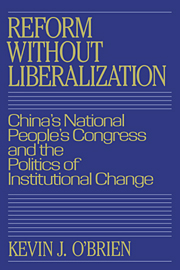 Reform without Liberalization
Reform without Liberalization 4 - Structural features
Published online by Cambridge University Press: 22 March 2010
Summary
Although declining elite support was an important factor in the NPC's demise, it was not the only one. Structural features and a divided mandate also circumscribed legislative development. On the one hand, the NPC was set up to build support and enhance stability – to mobilize and socialize subnational elites, to disseminate policy, and to gather information from the provinces. On the other hand, the NPC was also set up to undertake policy making (law making, supervision) and representative tasks. Though these roles were not necessarily incompatible, in practice, structural facilitators for support activities acted as structural constraints on policy activities. Four organizational attributes, embedded at the NPC's founding, inclined the legislature toward support and stabilizing functions and away from decision making and representation: (1) party control of deputy selection, (2) large chamber size, (3) brief, annual sessions, and (4) underdeveloped committees.
Elections and deputy quality
From the beginning, Chinese leaders understood that control of the NPC hinged on control of its personnel. Thus, when setting up the legislature, the Constitutional Drafting Committee reinstituted the four-stage election process first used in Jiangxi and the pre-1936 Soviet Union. Under this system, voters directly elected basic-level congresses, which then elected county congresses, which then elected provincial congresses, which then elected the NPC.
In 1953, Deng Xiaoping explained that so long as most voters were largely unfamiliar with national policies and the names of state leaders, indirect elections would be necessary.
Information
- Type
- Chapter
- Information
- Reform without LiberalizationChina's National People's Congress and the Politics of Institutional Change, pp. 61 - 73Publisher: Cambridge University PressPrint publication year: 1990